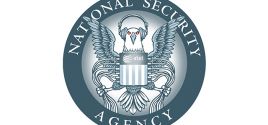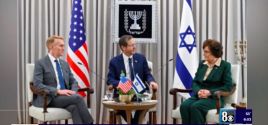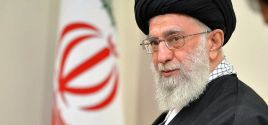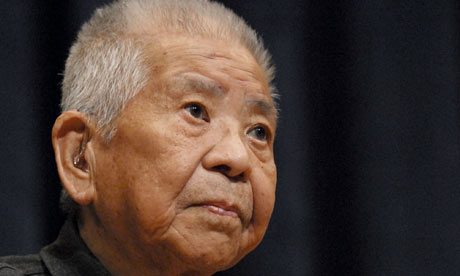Hiroshima and Nagasaki survivor dies aged 93Tsutomu Yamaguchi, the only official survivor of both atomic bombs in Japan, dies of stomach cancer# Justin McCurry in Tokyo 6 January 2010 The Guardian Jan. 10, 2010 |
Popular 
John Hagee Cheers Israel-Iran Battle as 'Gog and Magog War,' Will Lobby Congress Not to Deescalate

Right-Wing Media See Traffic Plummet in Wake of Algorithm Changes by Facebook, Google

Patriot ACT on Steroids: FISA Bill Forces 'An Enormous Range' of Businesses to Act as NSA Spies

Congress Introduces ADL-Backed 'Countering Antisemitism Act' to Police Online Speech

Reuters: Iran Gave 'Wide Notice' Days Before Attack on Israel
  Tsutomu Yamaguchi witnessed at close hand the nuclear devastation of two Japanese cities, and lived to tell the tale. Now it will be left to others to tell his incredible story after his death this week at 93. Tsutomu Yamaguchi witnessed at close hand the nuclear devastation of two Japanese cities, and lived to tell the tale. Now it will be left to others to tell his incredible story after his death this week at 93.Yamaguchi, the only person officially recognised as a survivor of the atomic bombings of Hiroshima and Nagasaki, died on Monday of stomach cancer at a hospital in Nagasaki, his family said today. The mayor of Nagasaki said "a precious storyteller has been lost". Yamaguchi, then an engineer for the shipbuilder Mitsubishi Heavy Industries, was in Hiroshima on a business trip on 6 August 1945 when an American B-29 bomber, the Enola Gay, dropped an atomic bomb on the city, killing 80,000 people instantly and another 60,000 in the months that followed. The badly burned Yamaguchi, who was less than two miles from the blast, spent the night in an air raid shelter before returning home to Nagasaki, 180 miles away, two days later. He was in Nagasaki on 9 August when a nuclear bomb devastated the city, killing an estimated 70,000 people. Japan surrendered less than a week later. He, his wife and baby son survived and spent the following week in a shelter. After the war Yamaguchi worked as a translator for the US forces in Nagasaki and later became a teacher. He did not speak publicly about his past until the death in 2005 of his second son – who was six months old at the time of the Nagasaki bombing – from cancer, aged 59. "My double radiation exposure is now an official government record," he told the Mainichi newspaper last year. "It can tell the younger generation the horrifying history of the atomic bombings even after I die. I could have died on either of those two days. Everything that follows is a bonus." In recent years he talked openly about life as a double A-bomb survivor and became a vocal supporter of nuclear disarmament. He wrote books and songs about his experiences, and in 2006 made a speech at the UN in New York to mark the release of Niju Hibaku (Double Irradiation), a documentary about him and other people who had lived through both nuclear attacks. Although 165 people are known to have lived through both attacks, Yamaguchi is the only one to have been officially recognised as a survivor twice over. "Having experienced atomic bombings twice and survived, it is my destiny to talk about it," he told the UN. Last month he was visited in hospital by the film director James Cameron, who is reportedly considering making a film about the bombings. Yamaguchi's copy of the Atomic Bomb Victim Health Handbook, issued in 1957, entitled him and 260,000 other survivors to monthly allowances, free medical checkups and funeral costs. Although the handbook confirmed he was within a three-kilometre radius of ground zero in both cities, reference to Hiroshima was deleted when he renewed it at Nagasaki city hall in 1960. After refusing to grant him special double-survivor status because it would not affect his entitlements, officials relented last March, making him the first and so far only survivor of both attacks to be recognised by the authorities. The blasts deprived him of the hearing in his left ear, but Yamaguchi's family said he was in relatively good health for most of his life. In later years he battled acute leukaemia, cataracts and other radiation-related ailments. |



